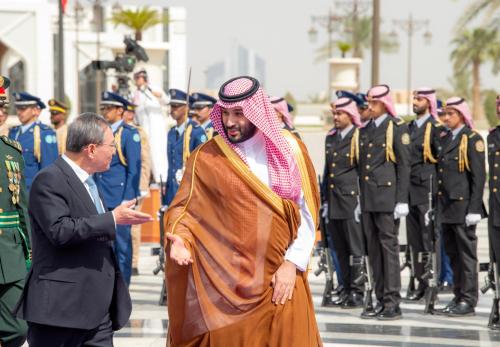Yesterday’s brutal, abrupt execution of the second ranking ruler of North Korea, Jang Song-thaek, culminated a stunning week in Pyongyang, perhaps the world’s most isolated and repressive capital. For much of its history, North Korea has posed acute threats to the outside world. It is the most militarized regime on earth and in recent years has repeatedly threatened South Korea and persisted in the development of nuclear weapons and ballistic missiles, while sustaining a highly repressive course toward its own citizens.
However, the execution of Jang, by marriage a member of the ruling Kim dynasty, represents a very different threat to the system’s viability. For decades, North Korea (though mired in economic dysfunction and international isolation) has sought to maintain a façade of unity within its ruling elites. On Sunday, North Korea’s young leader, Kim Jong-un, presided over an enlarged session of the Party Politburo, where Jang was accused of a wide array of crimes, including the building of a “factional group” within the leadership and a variety of lesser sins. At the staged trial prior to his execution, Zhang was explicitly charged with plotting the overthrow of the Kim regime. Though Jang was not as close to Kim Jong-un over the past year, he seemed the indispensable fixer of the North Korean system, and among the handful of senior politicians who had meaningful international experience, most notably with China.
Jang’s humiliating disgrace at the Politburo meeting, where he was removed from his seat in full view of the country’s ruling elite, and his execution four days later revealed fissures within the political leadership that analysts had long suspected but could never prove. Kim Jong-un, the impetuous young son of Kim Jong-il, anointed as his father’s successor in the elder Kim’s waning months, was the decisive force in these events. Since Kim Jong-il’s death in December 2011, Kim Jong-un had moved quickly to dislodge elder leaders from power (including many senior military officers) and to establish a political and personal style that had much more in common with his grandfather, Kim Il-sung, who established the Kim dynasty in the 1940s and presided over North Korea for nearly a half century.
As a general rule, North Korean leaders have exited quietly from the scene, presumably enabling them to retain the privileges associated with their status in the system, though from time to time some were banished to the hinterlands. But Jang’s abrupt execution bears immediate comparison with events of the mid 1950s, when Kim Il-sung accused various political rivals of factionalism and illicit dealings with the Soviet Union and China.
The immediate questions—and ones that cannot yet be answered—is whether Kim Jong-un acted out of weakness or out of strength, and also whether Jang’s purge and execution will lead to larger reverberations within the system. To some analysts, Kim Jong-un was increasingly fearful that Jang’s extensive political and personal networks would ultimately enable Jang to undermine young Kim’s rule. Kim’s grandiose and impetuous style might very well have offended others within the system, where deference to elders has long been prized.
To others, however, Kim has taken firm control of the levers of power and ensconced himself in an unchallenged position atop the system. He has moved rapidly to displace his deceased father’s long loyal subordinates, and Jang’s purge and execution demonstrate that he will demand absolute loyalty to his rule and obeisance to all his decisions. Several members of the ruling elite with ties to the Kim family that stretch back decades have already been executed (as distinct from officials of lesser rank who have occasionally suffered the same fate), and unquestioned obedience might well prove the order of the day.
What happens next? The immediate question is the depth and severity of the coming purge. It is likely that thousands of officials linked to Jang could face either dismissal or death. The prospect of a reign of terror within North Korea could trigger unforeseen consequences, either intimidating elites near the center power or undermining their loyalty to the system. The very logic of “a traitor in our midst” undermines the Kim clan’s repeated claims of political omniscience and omnipotence, revealing the depravity and deception that has been among the secrets of the regime’s longevity.
The possibility of a far reaching purge in a nuclear-armed state defined predominantly by hostility to the outside world is deeply disquieting. Amidst the uncertainties and dangers posed by Jang’s ouster and execution, there is an urgent need for all surrounding powers and the United States to consult closely to limit the risks of an even larger crisis.
The Brookings Institution is committed to quality, independence, and impact.
We are supported by a diverse array of funders. In line with our values and policies, each Brookings publication represents the sole views of its author(s).



Commentary
Is North Korea Imperiled?
December 13, 2013